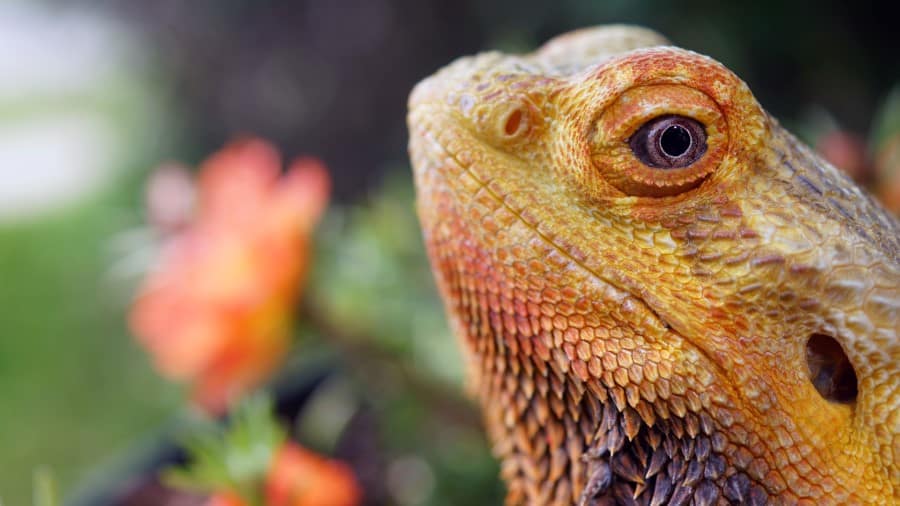
Bearded dragons are so cool but sometimes I wonder if they are color blind. Many people don’t know this, but they have minor abilities to change color as well just like their chameleon cousins. This makes me think whether or not they can see these colors or they are blind to them.
Bearded dragons are not color blind. In fact, not only can they see color, they can see it better than most other living things. This is because bearded dragons have an extra color receptor when compared to humans, which gives them access to a new spectrum of light.
So bearded dragons are pretty impressive when it comes to the ability to see color. Most reptiles have more color receptors than most living things do, which allows them to see more than usual. What exactly can bearded dragons see when it comes to color?
Things Bearded Dragons Can See When It Comes to Color
Typically, a normal eye has 3 color receptors that receive one color each to mix and match into the colors you see with your eyes today. Reptiles like bearded dragons have 4 color receptors in their eyes. This allowed them to receive light that is invisible to others.
Ultraviolet Light
Ultraviolet light, or UVB, is a spectrum of light that lies on a different spectrum of light when compared to what we can see. This is typically radiated from the sun and is the same thing that we all use to produce Vitamin D.
Some birds are known to reflect this light as well which gives stunning colors when put under a UVB bulb. Not only that, but since bird hunt bearded dragons in the wild, it gives them an advantage over them as they can see them easier.
Infrared Light
Infrared is another set of lights that can’t be seen with the naked eye. It’s typically found in phones, tv, and night vision technology. This light is typically still detectable even when no visible light can be seen.
However, this doesn’t mean that bearded dragons can see in the dark very well though. Since bearded dragons are diurnal creatures who are active in the day, they never developed the ability to do so.
The only difference is if there was infrared light in front of you and them, they would see it. Since they can see more colorful things that most beings can’t, is it possible for them to be color blind?
Can Bearded Dragons Be Color Blind?
A bearded dragon can’t be color blind. The term color blind only applies if a living thing is unable to perceive at least 3 colors at once with its eyes.
This is determined by the number of color receptors the eye has in which a normal one has 3. As I’ve previously discussed, bearded dragons have at least 4 color receptors in their eyes. Not only does this allow them to see more, but also allows them to see it better than others.
Therefore, it is almost impossible for a bearded dragon to develop color blindness. Since they can see so much more, they use their color vision for a variety of things…
Advantages of Bearded Dragons’ Heightened Senses
Being able to see a whole new spectrum of light just opens up so many possibilities. Imagine being able to see things that others can’t normally see, it’s almost as if it was a superpower.
Here are a few things bearded dragons can do with their heightened color vision.
Hunting
Being able to perceive color better than others, bearded dragons have the advantage when it comes to hunting. Being able to see an additional color, they can very easily pick out their prey even when they are hiding within a crowded environment.
Bugs will look clearer even if they were hiding in the tall green grass. Crickets would be easier to see even if they were jumping around from plant to plant. This is all possible simply due to their incredible sensitivity to color.
Survival
Not only does their heightened sense of sight allow them to hunt better, but it also prevents them from being hunted so easily. As previously mentioned, some birds are known to reflect UVB lights off their feathers when they soar around looking for their next meal.
Bearded dragons will be able to see these birds miles away before they even get close enough to catch them. Bearded dragons will also be able to distinguish predators hiding in the environment as certain colors will reflect on them. These are typically not sensible by normal eyes.
Since UVB is essential for bearded dragons, being able to see it will allow them to look for the best spots to absorb it. This is very helpful when a bearded dragon feels like it’s time for a good sunbathing.
Without UVB, bearded dragons can’t produce Vitamin D, which keeps their skin healthy and regulates the calcium and phosphorus in their bodies. You can see how this special ability is vital to their survival based on that alone.
Communication
For animals, they don’t have a universal language like we do. Some of them use color as a way to express their feelings and messages to other animals.
Bearded dragons happen to be one of those animals that use color as a means of communication. Though they can’t turn their entire body into a specific color, they can turn specific body parts into different colors instead.
Their color vision allows them to easily distinguish any color changes between bearded dragons even if it is as subtle as a night’s whisper.
Conclusion
Bearded dragons are not color blind. Not only are they able to see color, but they can see more than what we usually see as humans.
Their senses to colors are so great that they can even see UVB rays which are essential when it comes to their health and survival. Better color sensitivity also means that bearded dragons can easily pick out other animals that are hiding in the background.
I wish I could see just as many colors as a bearded dragon can, just imagine the possibilities!


